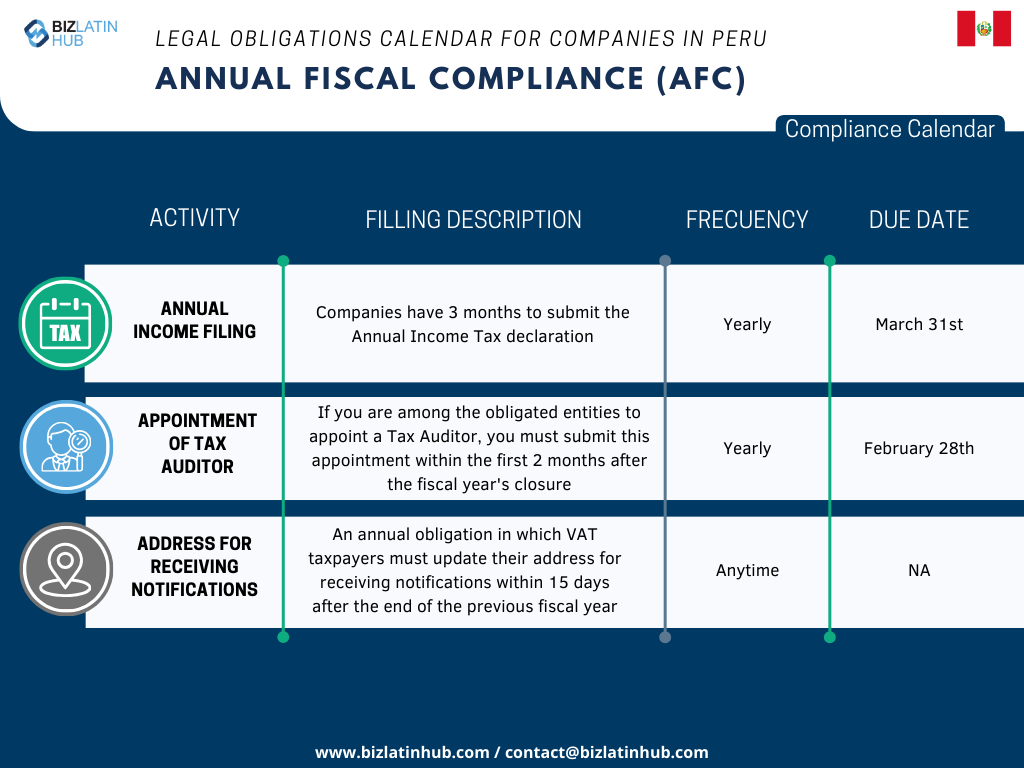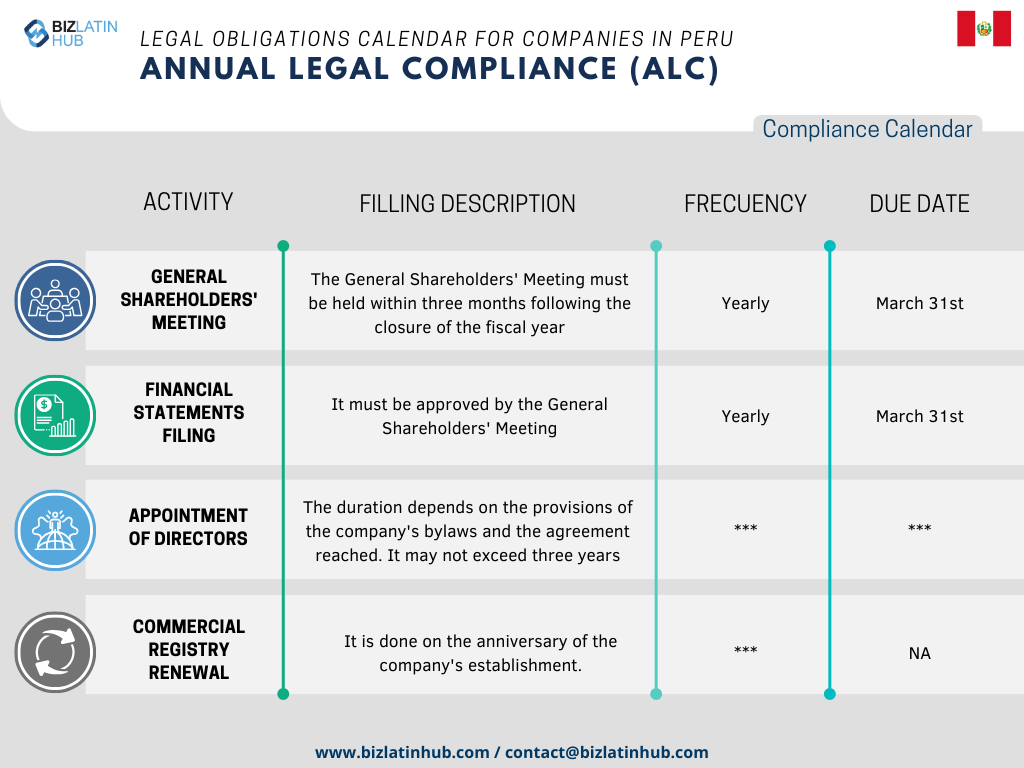Anyone doing business in the Peruvian market or intending to launch there will need to be sure to adhere to regulatory compliance in Peru in order to maintain their good standing and avoid legal inconveniences.
Regulatory compliance is part of corporate compliance and forms an important element of corporate secretarial services (cosec) packages required by all companies in Peru.
Your corporate lawyer in Peru will be able link you up with a reliable accounting firm, or if you contract a provider that offers a broad portfolio of professional services, it will be able to offer financial regulatory compliance as part of a package of integrated back-office services.
If you are interested in company incorporation in Peru, read on to learn the basics of financial regulatory compliance in this South American country.
Or contact us now to find out more about how we can support you doing business in Peru, among the 16 markets in Latin America and the Caribbean where we have teams in place.

Table of Contents
Entity Compliance – Peruvian market a prime destination for investment
Peru is one of the most popular destinations in Latin America and the Caribbean for foreign direct investment (FDI).
Notably, FDI as a percentage of GDP has followed a general upward trajectory over recent years — rising from $2 Billion in 2021 to $5.1 Billion in 2022 — highlighting increasing interest from international capital.
Since 2019, the Peruvian economy — like most — has suffered disruption due to the COVID-19 pandemic, with gross domestic product (GDP) declining from $228.4 billion in 2019 to $202.01 billion in 2020. However, the World Bank has predicted that in 2024, the economy will grow by 2,3%.
Peru is famed for being a significant producer of gold, copper, and agricultural products, with fruits, nuts, and animal fodder among its key exports. The fishing industry is also very important, with seafood another key export.
Meanwhile, the services sector is increasingly important to the economy, generating 49% of GDP in 2022. That sector includes the likes of providers of financial regulatory compliance in Peru.
Peru is also a hub for international trade, with the port of Callao, near capital Lima, among the top six ports in Latin America and the Caribbean for container throughput. That is bolstered by Peru’s status as a founding member of the Pacific Alliance — a decade-old economic association that also includes Chile, Colombia, and Mexico, and which recently accepted Singapore as its first associate member as it looks to expand beyond Latin America.
Peru is also a member of the Andean Community of Nations (CAN) — a regional integration initiative that also includes Bolivia, Colombia, and Ecuador.
In August 2021, CAN introduced a freedom of movement statute, while in October it launched a regional trademark database that will bring together intellectual property claims for the whole region.
All of this contributes to the Peruvian market’s popularity as an investment destination, however to take full advantage of it, you must understand and be in line with regulatory compliance in Peru.
Legal Entity regulatory compliance in Peru: key responsibilities and dates
While regulatory compliance in Peru may vary based on the type of entity you have, the following requirements are usually applicable:
An annual tax declaration must be made, usually within three months of the end of each fiscal year, which in Peru runs from 1 January to 31 December.
Note that the actual date on which the declaration should be submitted is dictated by the last digit of the company’s tax ID number, and the tax authority (SUNAT) published a calendar each year which includes those dates.
Holding an annual shareholders meeting (AGM) must be done within three months of the close of the fiscal year, meaning that the AGM must take place by 31 March.
The AGM will include discussion of the financial statements of the previous year, which must have been approved by the company and submitted to the SUNAT. Minutes must be properly recorded from the AGM.
Circulation of those minutes is a prerequisite of legal regulatory compliance in Peru, usually via a board of directors meeting.
Updating the corporate books, which include the minutes from AGMs and the shareholder registry, among other details, must be done to adhere to legal regulatory compliance in Peru.

Common Questions for Entity Legal Compliance in Peru
Based on our extensive experience these are the common questions and doubts of our clients when looking to operate within the country
The following are the most common statutory appointments for Peruvian legal entities:
– An appointed Legal Representative who will be personally liable, both legally and financially for the good operation and standing of the company. This should be a local national or a foreigner with the right to live/work in the country.
Yes, a Registered Office Address or local Fiscal Address is required for all entities in Peru for the receipt of legal correspondence and Governmental visits.
Biz Latin Hub can assist you with legal regulatory compliance in Peru
At Biz Latin Hub, we have the people and expertise to be able to assist you with financial regulatory compliance in Peru. Our comprehensive portfolio of professional solutions includes company formation, accounting & taxation, legal services, visa processing, and hiring & PEO, and we offer tailored packages of integrated back-office services to suit every need.
As well as Peru, we have teams in 15 other markets around Latin America and the Caribbean, and trusted partners who extend our coverage to almost every corner of the region, and we specialize in multi-jurisdiction market entry.
Contact us now to find out more about how we can assist you in doing business in Peru.
Or read about our team and expert authors.

The information provided here within should not be construed as formal guidance or advice. Please consult a professional for your specific situation. Information provided is for informative purposes only and may not capture all pertinent laws, standards, and best practices. The regulatory landscape is continually evolving; information mentioned may be outdated and/or could undergo changes. The interpretations presented are not official. Some sections are based on the interpretations or views of relevant authorities, but we cannot ensure that these perspectives will be supported in all professional settings.